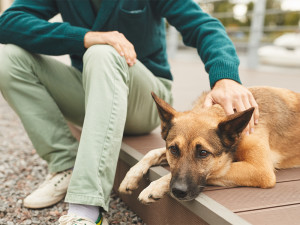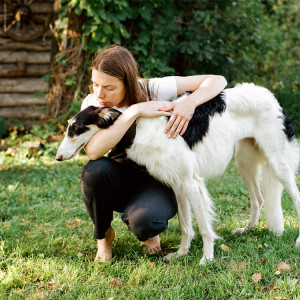What Are the Causes of a Spastic Colon in Dogs?
That doesn’t sound good...

Share Article
In This Article:
What is Spastic Colon in Dogs? Spastic Colon Causes in Dogs How to Treat Spastic Colon in Dogs? Frequently Asked Questions
Every dog parent dreads those middle-of-the-night wake-ups from a pup who urgently needs to poop. Or even worse, coming home to discover that your dog has already gone and couldn’t hold it. A very loose stool combined with an urgent need to poop more frequently is a classic sign of large-bowel diarrhea.
Luckily for all of us, most dogs with diarrhea get better within a few days. When dogs have ongoing large-bowel diarrhea, this is considered a chronic condition that is occasionally referred to as a spastic colon. There are many possible causes for this type of chronic large-bowel diarrhea in dogs including food allergies, autoimmune disease, and/or infections. It is very important to seek veterinary care for a dog with ongoing diarrhea in order to get an accurate diagnosis and bring them much-needed relief.
What is a spastic colon in dogs?
Spastic colon is a term that used to be used in human medicine to describe chronic, large-bowel diarrhea, which in humans is often caused by irritable bowel syndrome, or IBS. While this term is not often used in veterinary medicine, it is very useful to characterize a dog’s symptoms into either small bowel or large bowel signs. This helps to narrow down possible causes and create a targeted treatment plan.

Small-bowel diarrhea is due to a problem within the small intestines and is most commonly associated with larger amounts of diarrhea or weight loss. Large-bowel diarrhea is localized to the large intestines, or colon, and is usually described as smaller amounts of diarrhea with increased urgency, the presence of mucus and/or bright red blood, and straining to poop. There can be many causes of large-bowel diarrhea in dogs. Diarrhea in dogs usually goes away within a matter of days. However, some dogs have chronic, or ongoing diarrhea that does not resolve on its own. In these cases, it is very important to see a vet to determine the underlying cause and start an appropriate treatment plan.
Types of spastic colon
The different types of large bowel diarrhea are typically characterized by their underlying causes. In order to determine the cause, veterinarians use a combination of tools, including a detailed history of a dog’s illness, a thorough physical exam, and tests like bloodwork, ultrasound, fecal analysis, diet trials, or a colonoscopy with biopsies.
Is a spastic colon common in dogs?
Diarrhea that stems from the large intestine is common in dogs. Dogs can have short-term diarrhea, where the signs only last a day or two, or they may experience longer term issues where their diarrhea continues on and on. Or, dogs may have diarrhea that comes and goes for weeks or even months.
Spastic colon causes in dogs
There are many possible causes for large-bowel diarrhea in dogs. When it comes to conditions that tend to be chronic and don’t resolve on their own, the list includes:
Food allergy
Dogs with a food allergy or sensitivity may develop chronic diarrhea. These pups may also have other signs including itchy and inflamed skin, recurring ear infections, or anal gland problems.
Autoimmune disease
Similar to humans, dogs can suffer from inflammatory bowel disease, also known as IBD. This is a condition where the body’s immune system has an inappropriate response, leading to unchecked inflammation within the digestive tract. Dogs with IBD typically have signs lasting more than three weeks, and they may have other signs of digestive upset including vomiting, decreased appetite, or weight loss.
Hormone imbalances
In conditions like Addison’s disease, the body does not produce adequate amounts of steroid hormones. Dogs with this condition often have chronic diarrhea along with other signs like decreased appetite, vomiting, shaking, or lethargy.
Stress and anxiety
In stressful situations, dogs can develop a condition known as stress colitis, which is typically acute, large-bowel diarrhea. Most of the time, it resolves when the stressor disappears. A classic example is stress colitis in dogs who are boarded in a kennel. They may develop large-bowel diarrhea during or after being boarded, and it usually resolves within a few days of returning home. In other cases, when dogs are more frequently exposed to their triggers, such as dogs with separation anxiety, it is possible for stress colitis to be a more chronic condition.
Infections
There are a number of different infectious agents that cause large-bowel diarrhea. Many times, these infections will only last a few days before the immune system clears them. But there are some infections that are more complicated to clear and may lead to chronic diarrhea including some intestinal parasites and bacterial infections like Salmonella.
Diet changes
Dogs with chronic diarrhea may benefit from a diet change, especially when a food allergy or inflammatory condition like IBD is suspected. In these cases, it is important to choose an appropriate hypoallergenic and easily digestible diet. Many over-the-counter diets that claim to be limited ingredient diets are not sufficient for this kind of diet trial. This is because they are made using the same machinery as other diets and may not be free of contaminants. Your vet will likely recommend a prescription diet that is manufactured on its own dedicated machinery in order to avoid contaminants.
Medications
Some medications may have the unfortunate side effect of causing diarrhea. Not every dog will experience the same side effects, but it is good to be aware of the possibilities. Some common medications that may cause diarrhea include antibiotics and non-steroidal anti-inflammatory medications (NSAIDS).
Cancer
Some dogs with chronic diarrhea may also be suffering from cancer. In dogs, cancers like adenosarcoma and lymphoma are more common within the intestines. Diagnostic tests — namely an abdominal ultrasound and a colonoscopy with biopsies — are most helpful in making this kind of diagnosis.
How do you treat a spastic colon in dogs?
Treatment for large-bowel diarrhea will be most effective if it is targeted to the underlying cause. So, it is most helpful to consult with a vet before treating your dog’s diarrhea, especially in these chronic cases where they have diarrhea for many weeks. Some of the most common treatments include:
Diet change
Dogs with chronic diarrhea may benefit from a diet change, especially when a food allergy or inflammatory condition like IBD is suspected. In these cases, it is important to choose an appropriate hypoallergenic and easily digestible diet. Many over-the-counter diets that claim to be limited ingredient diets are not sufficient for this kind of diet trial. This is because they are made using the same machinery as other diets and cannot be free of contaminants. Your vet will likely recommend a prescription diet that is manufactured on its own dedicated machinery and made to avoid contaminants.
Fiber
Some dogs have a fiber-responsive large-bowel diarrhea and their signs will improve when additional fiber is added to their diet. It is important to note that this can be an effective treatment for large-bowel diarrhea but can actually make small-bowel diarrhea worse. Also, too much fiber can cause diarrhea. Be sure to consult your vet to determine if added fiber is a good option for your dog’s specific signs and how much to give them.
Probiotics
Probiotics are the good microbes in the gut that do lots of amazing things. They can block bad germs from setting up shop in the gut, reduce inflammation, improve digestion, and even influence health outside the gut. Plus, in most cases, there is little risk in giving them a try if your vet gives you the go-ahead. Be sure to purchase dog-specific probiotics, as they tend to have a different assortment of microbes in their guts than humans do.
Prescription medications
If your dog is having chronic diarrhea and has not responded to lifestyle changes like those listed above, it’s time to consult your vet about the next step. This often includes prescription medications that treat common causes of diarrhea, including deworming medications. If your vet has performed additional diagnostic tests and found a specific condition like IBD or Addison’s disease, your dog will need to take medications to manage these diseases and bring them much needed relief.
Stress management
Stress management is great for every dog and is certainly very important for dogs that suffer from stress colitis. Depending on your dog’s triggers, they may respond to techniques like increased exercise, mental enrichment, training sessions, behavior modification, or prescription medications including sedatives or anti-anxiety medications.
Bottom line
Chronic large-bowel diarrhea, occasionally called spastic colon, is characterized by frequent episodes of diarrhea that may contain mucus or blood, and are often accompanied by straining to poop
There are many possible causes for chronic diarrhea in dogs, and it’s important to work with a vet to get an accurate diagnosis
While some causes for chronic diarrhea may be cured completely, others may require lifelong management, diet changes or medications.
FAQs
How serious is a spastic colon?
This depends on the underlying cause and a dog’s specific symptoms. Some types of diarrhea can be easily cured while others may require lifelong treatment. Any dog with chronic diarrhea needs medical attention as the longer it continues, the more likely they are to develop serious secondary problems.
Can spastic colon in dogs lead to other health problems?
Yes, chronic diarrhea can lead to other health problems including weight loss, decreased absorption of important nutrients, dehydration, weakness, and more. Depending on the underlying cause of the diarrhea, there can be other serious complications as well.
When should I bring my dog to the vet for a spastic colon?
Any dog with diarrhea lasting more than a few days should see a vet. Dogs with additional signs like vomiting, loss of appetite, or lethargy need to see a vet right away.
Are there any breeds known for being prone to digestive issues like spastic colon?
There are some dog breeds that seem to have hereditary forms of colitis. This includes Boxers and French Bulldogs.
References
Fritsch, D, et al. "A prospective multicenter study of the efficacy of a fiber-supplemented dietary intervention in dogs with chronic large bowel diarrheaopens in new tab." BMC Veterinary Research, 24 June 2022.
Lecoindre, P et al. "Chronic idiopathic large bowel diarrhea in the dogopens in new tab." Veterinary Clinics of North America: Small Animal Practice, vol. 41, no. 2, March 2011, pp. 447-456.
Leib, M, "Chronic large bowel diarrhea in dogs: What's new? (Proceedings)opens in new tab" DVM 360, April 2008.
Matsuyama, A. “Gastrointestinal neoplasia in dogs and catsopens in new tab.” Merck Veterinary Manual, January 2025.

Dr. Amy Fox, DVM
Amy Fox, DVM is a small animal veterinarian in New York City with over thirteen years of experience in a mixture of general practice, emergency medicine, and shelter medicine. A lifelong animal lover, Dr. Fox studied biology in college and then worked as a veterinary nurse before pursuing veterinary school at Cornell University. Her expertise includes surgery, dentistry, and management of chronic conditions, and she is interested in toxicology, pain management, nutrition, care of senior pets, and educational outreach. Dr. Fox also enjoys writing about veterinary medicine and teaching, and her work has previously appeared in Spruce Pets. In her free time, she loves to cook, garden, go for long runs, and hang out with her goofy mixed-breed dog May, who provides never ending comic relief!
Related articles
![A dog sitting on the floor with a bowl of kibble.]()
Everything You Need to Know About Your Dog’s Gut Microbiome
Microscopic organisms may reveal pathways to better health for your pet.
Can You Give Dogs Tums?
Learn what’s safe to do when they have tummy troubles.
![Constipated German Shepherd being comforted by its owner]()
Gut Feelings: Dogs Get Constipated Too
What to do when your pup can’t poop.
What Causes Mucus in Dog Poop?
![Same sex couple with their dog lying on the bed laughing at his farts]()
Why Do Dogs Fart? Causes and Remedies for Dog Flatulence
Expert solutions for your pup’s unfortunate flatulence.
![A mini golden doodle puppy licking and grooming itself.]()
Treatment for Your Dog’s Bleeding Anus: Home Remedies and Medical Options
It’s not a pretty problem, but here are your solutions.







